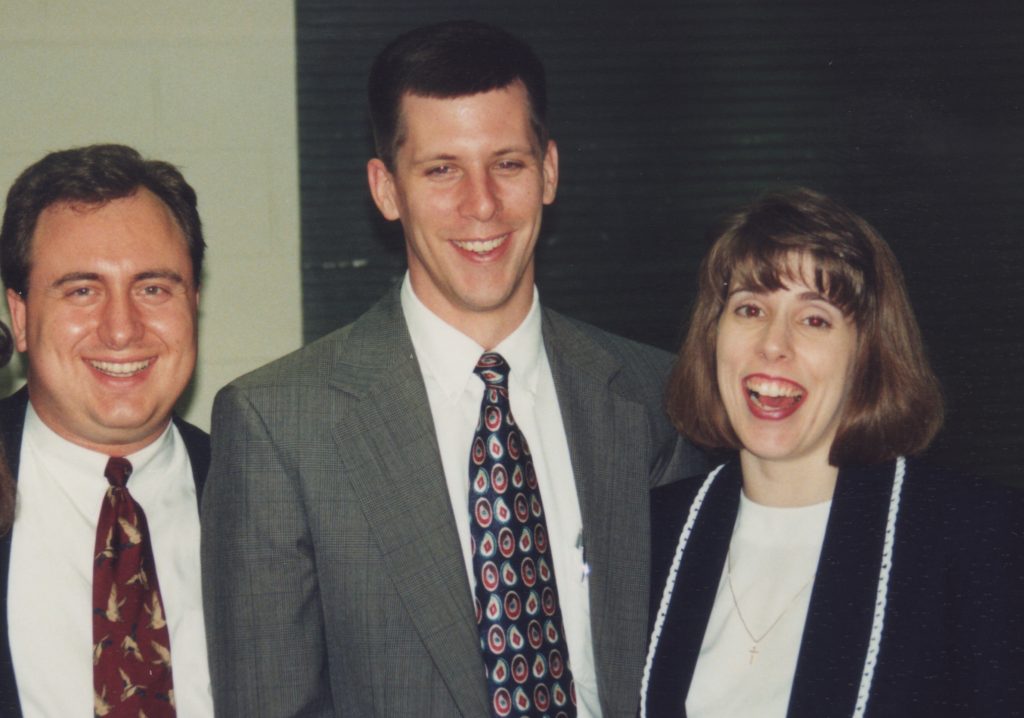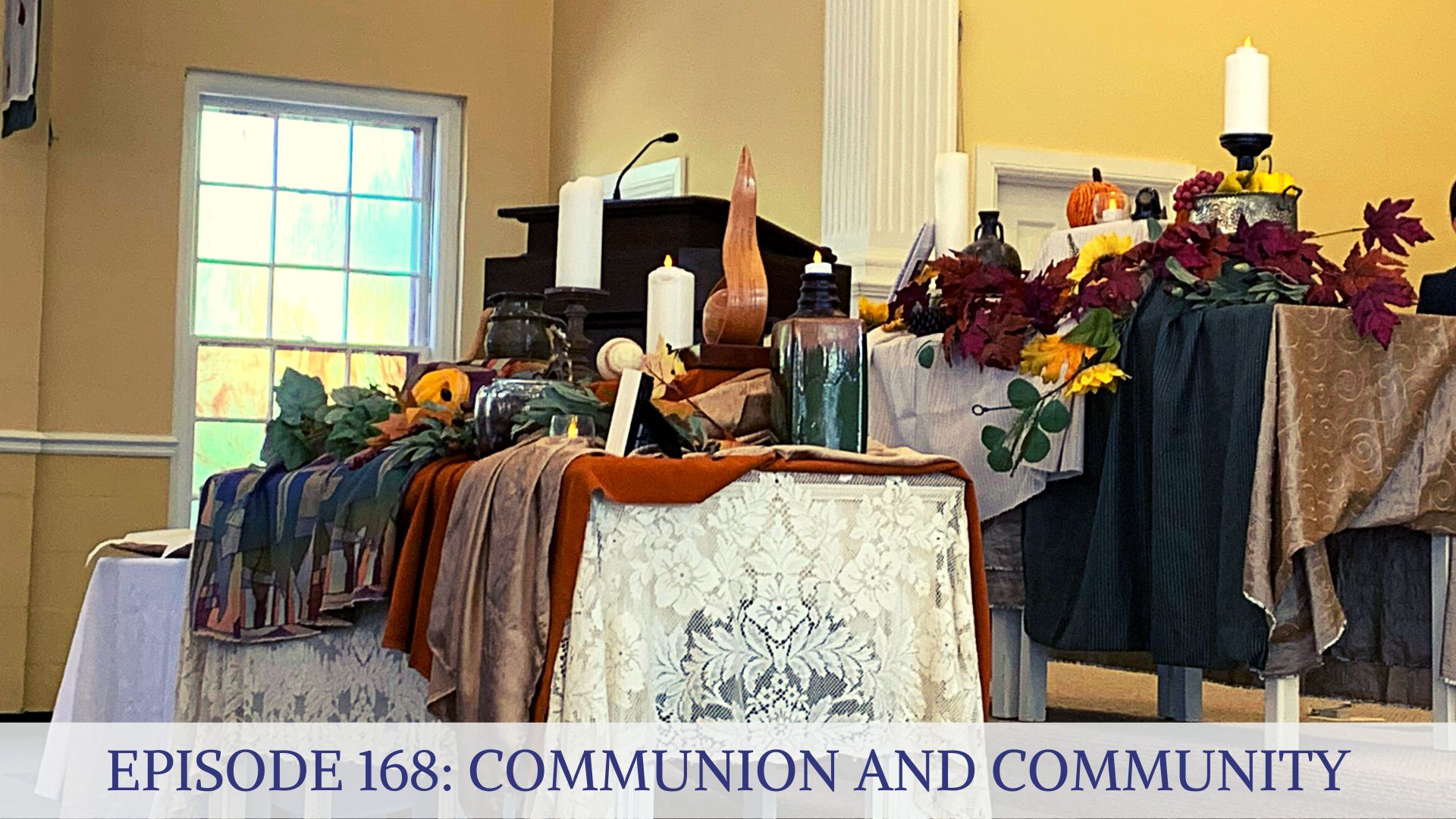World Communion Sunday created an opportunity for reflection on theologies of communion and community in a new era of ministry. The following is a sermon I preached at Glendale Baptist Church on October 2, 2022.
++++++++
Philippians 4: 1-9
4:1 Therefore, my siblings, whom I love and long for, my joy and crown, stand firm in the Lord in this way, my beloved.
4:2 I urge Euodia and I urge Syntyche to be of the same mind in the Lord.
4:3 Yes, and I ask you also, my loyal companion, help these women, for they have struggled beside me in the work of the gospel, together with Clement and the rest of my co-workers, whose names are in the book of life.
4:4 Rejoice in the Lord always; again I will say, Rejoice.
4:5 Let your gentleness be known to everyone. The Lord is near.
4:6 Do not worry about anything, but in everything by prayer and supplication with thanksgiving let your requests be made known to God.
4:7 And the peace of God, which surpasses all understanding, will guard your hearts and your minds in Christ Jesus.
4:8 Finally, beloved, whatever is true, whatever is honorable, whatever is just, whatever is pure, whatever is pleasing, whatever is commendable, if there is any excellence and if there is anything worthy of praise, think about these things.
4:9 Keep on doing the things that you have learned and received and heard and seen in me, and the God of peace will be with you.
Is that Paul or Pauline?
As you may have heard, we do not preach all that often from the letters of Paul at Glendale Baptist Church. Or the letters that pretend to be from Paul. It was quite popular and normative in the first and second centuries common era to write letters in the name of someone famous and important to help give credibility to your writing. It was a little like sampling on a hip-hop song. Plagiarism was not a concept in that time, so in fact we don’t know which of the Pauline letters were truly from Paul’s hand, and which ones were in Paul’s name. However, Philippians is one of the least contested.
Once while I was a teaching assistant in college for my mentor, Carolyn Blevins, she and I had a good laugh when a student answered on an exam “No, that letter was not written by either Paul or Pauline.”
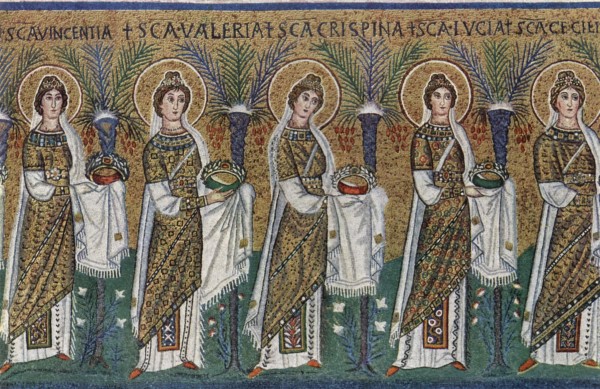
Perhaps there were some Paulines that were writing letters to the early church, right? There is a pretty good case for Hebrews being written by a woman. And certainly there were women leading the church like Dorcas, Junia, Pricilla, Euodia and Syntyche. Surely some of them had something to say in writing?
Change over Time
When I said yes to leading worship today, I did not realize I was saying yes to a homily. But I had a good chuckle when I saw the order of service. I often find myself saying yes to more than I realize. Also I thought back to my first sermons, preached during clinical pastoral education (CPE) over 30 years ago. Those early sermons took me at least three or four weeks to write. Now three days sounds like plenty of time. Because for the last decade I write the equivalent of a sermon every week for my blog, alongside other writing projects.
Over the last three decades writing has at least become easier, if not somehow better. That kind of change over time is indeed what I study in my research about ministry. One of the things we try to examine in our longitudinal study (which is a fancy way to say, a study that goes on for a long time and follows people for many years) is how people change and deepen their capacities for ministry. That capacity, what we call pastoral imagination, expands and grows over the course of many years.
In the past two years in addition to interviews for the Learning Pastoral Imagination Project, I was invited to survey and interview graduates of Austin Presbyterian Theological Seminary. And I also learned from lay leaders in churches affiliated with APTS. Those interviews definitely expanded and deepened my own learning. I got to ask clergy and laity, along with people who are already in the LPI study about what it has been like to live through the multiple pandemics since March of 2020. Through a range of questions we discovered challenges and delights, surprises and griefs, concerns and needs for support, desolation and resilience.
Stories of a New Era in Ministry
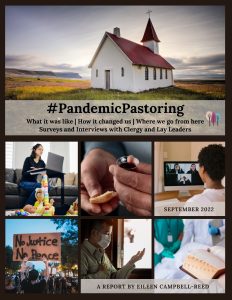 I would be hard pressed to overstate the power of hearing so many stories about how people experienced the last 30 months. It has changed our communities and our context for ministry. Churches are different. The world is different. And while change is the only constant on planet earth, the amount, intensity, and speed of change to church life in the past 2 ½ years is nearly impossible to calculate. Perhaps it is impossible. That’s why I continue to make a public case for the fact that we are living in a new era of ministry and church.
I would be hard pressed to overstate the power of hearing so many stories about how people experienced the last 30 months. It has changed our communities and our context for ministry. Churches are different. The world is different. And while change is the only constant on planet earth, the amount, intensity, and speed of change to church life in the past 2 ½ years is nearly impossible to calculate. Perhaps it is impossible. That’s why I continue to make a public case for the fact that we are living in a new era of ministry and church.
In the Fall of 2021, I interviewed Rev. Nancy (she/her) who is a pastoral resident in a large midwestern congregation. She spoke about how her church’s theology had crumbled in the pandemics. Then she connected the dots for us about how she and her colleagues are attempting to, “navigate the changes [of the pandemic] with grace.” She says, “The most pressing issue for us this week is World Communion on Sunday. What does that look like? We’re not even passing the peace in worship, which looks very different than it has in the past. Worship is very important to the members of the church… This will be the first time as a congregation that we are taking communion together.”
What were the practical realities of preparing for this big moment? Rev. Nancy continued, “Just yesterday we were in the sanctuary removing the little rubber pieces that are in each pew because the elements that we’re using — half juice and a little cracker? They don’t fit. Until we removed all these rubber pieces … So really, it’s getting stuff done in a way that can assist our congregation to fulfill exactly why we are the church, and to be able to do something like take communion together.”
How Has Covid-19 Changed the Way We Do Ministry?
Rev. Nancy continued, “And, that bleeds into the question about how Covid-19 changed how we do ministry. The one thing that I’ve noticed the most is how we are functioning in ministry from a place of scarcity. And functioning for the now, right now, which makes it hard to do those classes about what is the sacrament? Or anything else because what we’re doing is we’re just trying to get to next Sunday… [asking] Can we get our service live streamed on Sunday? Do we have the people to staff it? And that changes the dynamic of the church.”
Rev. Nancy is getting at how the immediacy of crisis times prevents focusing on the bigger picture. Ministers like Nancy spent a lot of their energy during the first two years shrinking their focus to the most immediate survival of the weekly routine and most basic connections.
I was serving on the leadership Council at Glendale when March 2020 rolled around. So I had a front row seat to the decision making. I remember asking early in March as we were contemplating the lockdown… Would we perhaps need to schedule a weekly zoom meeting for now? It seems like there might be a lot to decide and to do? At that moment no one saw it that way but me. We were not of one mind. By April we were indeed meeting weekly. Remember this was the period of time when “Everything we do before a pandemic will seem alarmist. Everything we do after will seem inadequate.” – Michael Leavitt.
These were difficult days and almost no one seemed to be of one mind… in the whole world.
The Gifts of Change
Glendale was certainly among the churches who said right up to the moment of March 2020: Who us live stream? Glendale a digital church? Meet virtually? No, no, and no. And yet within just a few short weeks we had joined the throngs who in an effort to contribute to the safety of our neighbors, decided to stay home and have church on zoom.
Curiously we soon learned that there were new, incredible, and unanticipated gifts of looking at the faces of people we loved dearly, although we could not be together in the same room face-to-face. And yet somehow because we knew these faces already seeing them on the screen was quite intimate. To be sure it was a HUGE labor of love on the part of our church staff, pastors, and Glenterns to make this holiness possible. They worked to make the space open, inviting, and sacred.
Why Euodia & Syntyche?
This brings me back to the question of why I chose a text from one of Paul’s letters this morning. I read through the various texts in lectionaries that we follow at Glendale. I looked at Dr. Wil Gaffney’s lectionary, which we are following to our great delight this year. And I considered the Revised Common Lectionary, followed for decades at Glendale. And I also looked at The Women’s Lectionary published in 2021 by a friend named Rev. Ashley Wilcox.
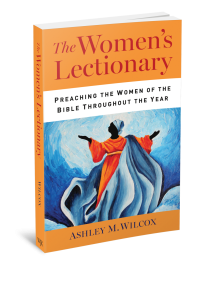 The Women’s Lectionary offers commentaries on a selection of texts that feature women from the Hebrew Bible and the New Testament. Weekly there are opportunities to read and preach from texts about the feminine divine and also stories of women. One of the things we miss when we don’t preach from Paul (or Pauline) is the stories about women that appear in his or her letters. When I discovered that Ashley Wilcox had chosen this story of Euodia and Syntyche for the 22nd week in Ordinary Time, it sounded just right.
The Women’s Lectionary offers commentaries on a selection of texts that feature women from the Hebrew Bible and the New Testament. Weekly there are opportunities to read and preach from texts about the feminine divine and also stories of women. One of the things we miss when we don’t preach from Paul (or Pauline) is the stories about women that appear in his or her letters. When I discovered that Ashley Wilcox had chosen this story of Euodia and Syntyche for the 22nd week in Ordinary Time, it sounded just right.
I listened to the entire text of Philippians to remember Paul aims. This is a letter about friends and getting along. Or NOT. It is a celebration of helping one another with mutual aid. Sending people and money and greetings back-and-forth, like we do with our partner church in Cuba. It is about friends who are ill and then recover. Friends who are like family, or as Brooke and Monica taught me: FRAMILY. Like one’s own child, parent, grandparent, brother, sister, or sibling. The writer of the letter dearly loves the people of Philippi and wants them to be a community of faith rooted and grounded in the love of God.
Disagreements in Community
Yet something is amiss. Some rift or difference is afoot. We never are let in on the secret of that disagreement … some schism or grief. Interestingly most (or many) scholars through the ages assume that the two women named in the letter are themselves bickering or fighting or somehow not of one mind. Such interpretations reveal the gender bias of many biblical interpreters. One went so far as to change the gender of one of the pair. Gender bending for the wrong reasons.
Let’s consider for a moment that Euodia and Syntyche were indeed more than friends or partners in the gospel. What if, as Ashley Wilcox asks, the two women were a missionary couple like the other linked pairs that Paul names in Romans? (Aquila and Priscilla, Tryphena and Tryphosa). Could it be that Euodia and Syntyche were partners in life as well as the work of the gospel, sharing the good news of God’s love?
When you read (or better yet HEAR) the entire text of Philippians at one sitting, you can notice that perhaps Paul was concerned about a disagreement – not between the two of them, but possibly with him. Perhaps it was they who did not see things the way Paul did. And Paul may have been trying to persuade these two women to think with him, and to be of one mind.
It reminds me of how much I heard in this past two years from pastors and lay leaders about conflicts, disagreements, and challenges that sometimes ended in a parting of ways.
Community Losses and Questions of Meaning
It also reminds me of mothers in my study who left ministry during the first two years of the Covid-19 pandemic to take care of children and elders. Some of them moving across the country, walking away from pastoral calls after a decade or more. Globally the Potential Project says more than 54 million women left their jobs during the COVID-19 pandemic. It’s an enormous even staggering number.
We don’t yet know. Were the departures part of a great resignation or will we look back and see that it was part of a great renegotiation? The loss of women’s labor and leadership is one more piece of the change that has put ministry into a new era.
Returning now to the question posed by Rev. Nancy. How will churches rethink the meaning of the crumbling theology of community and communion itself? When for so many months we took it in our own homes? Alone. While aware of our companion church members doing the same. That is if we remembered to get the bread and the juice, or if we had some suitable substitute, and if we were willing to make that great effort to be together in communion while sitting apart, in our homes. Even today some in the Glendale community are sharing communion while they join us for worship on Zoom.
Hybrid gatherings for worship, or Multi-access Worship are part of this new era of ministry. So how are we living into that new reality?
The Table of Communion and Community
Somehow this table, which transcends this particular table in time and place, has profound power for holding us together. Glendale gathered around this table virtually for a great number of months, and I would submit it was no less communion, and yet it came in a different form. And we needed to move our bodies and our thoughts and our relationships in a different way to achieve the communion of our community. And what held us together? It was the table. But more importantly the Spirit which calls us to the table, the Spirit which helps us to share in the mind of Christ that is to say, the good news of love and grace.
I admit it was hard at times to feel connected to all of you when I had not seen you face-to-face or shared table fellowship downstairs over a meal or upstairs at this communion table in this sanctuary. And yet the years of relationship and the amazing gifts of our worship leaders to weave us together even while we were all over the country and the globe gave me reasons to rejoice in my community with you. My communion with you. And to see that celebration and rejoicing here in this place and in all the many places that we gather. Today we are part of World Communion Sunday in which millions of Christians are gathered around tables virtually and in specific places celebrating the love and grace of God that weaves us together.
Embodied, Relational, Spiritual, and Integrated Ministry
From my research, I’ve spent more than a decade making a case that ministry and faith are embodied and relational and spiritual and integrated. Recovering a sense of the embodiment and not simply the thoughts about faith has been my project among (other things). And now we’re in a time where we need to figure out how to be together both in the room (the room where it happened as they say in Hamilton), and also in the Zoom room where it happened. In a hybrid, multi-access space. This is why we call ministry and discipleship, practices. They involve more than thinking. They require the movement of our bodies and shared stories about how we live this life together.
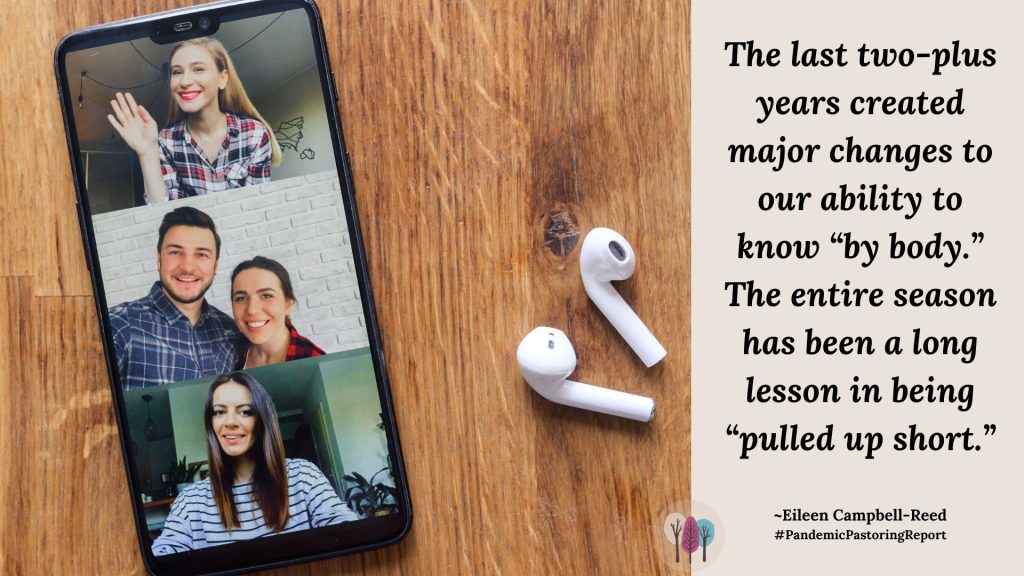 Human beings have been connected beyond the rooms where they meet for millennia. Paul’s letter to the Philippians was written from prison. He was concerned about differences of opinion. Many miles and many days’ journey away from where he was. He didn’t have the gift or immediacy of digital connections. He only had a scribe, some papyrus, and a person who carried his thoughts back-and-forth. And yet it was his community. These were his people. The siblings with whom he shared communion.
Human beings have been connected beyond the rooms where they meet for millennia. Paul’s letter to the Philippians was written from prison. He was concerned about differences of opinion. Many miles and many days’ journey away from where he was. He didn’t have the gift or immediacy of digital connections. He only had a scribe, some papyrus, and a person who carried his thoughts back-and-forth. And yet it was his community. These were his people. The siblings with whom he shared communion.
It is tempting to say that digital connections and virtual church ARE a lesser forms, perhaps even not good enough, or inferior ways of communion and community. But increasingly we have good reasons not to pit in-person and online against each other. Rather they are a continuum of the ways we engage in community and even communion. The real difference is not their spiritual or embodied qualities. Both are spiritual. Both are embodied. The real difference is that digital community and communion are something new, something still to be learned, practices we don’t know very much about yet.
More to Learn about Community and Communion
We have come a long way in 30 months, but we still have much to learn. Most of us were profoundly shaped by practices of being in the same room together. Yet throughout our lifetimes, we’ve also communed with each other through writing letters, and using the telephone, and reading newspapers and listening to the radio and television. And now we use our cell phones and social media.
Each new technology and platform brings a new way to imagine community and communion. To transcend the technologies themselves. We will be wise to continue expanding our imaginations about what it is to be the people of God, the community of faith, Glendalers taking part in communion and community in new ways.
Grief and Friendship
One of the griefs and desolations of this season of multiple pandemics for me has been the death of several men in my life. Childhood friends, spouses of friends, a student. Earlier this month I learned about the death of a friend who I met in seminary, and he was in many ways like a brother to me. Don Durham was like a brother with whom I did not always share the same mind. And yet he was a brother who is not afraid to speak his mind, nor to listen to mine. Sometimes in our arguing and our laughing around tables – at seminary and church and in our homes – we debated money and theology and denominational politics and power. And I’m pretty sure we made each other better.
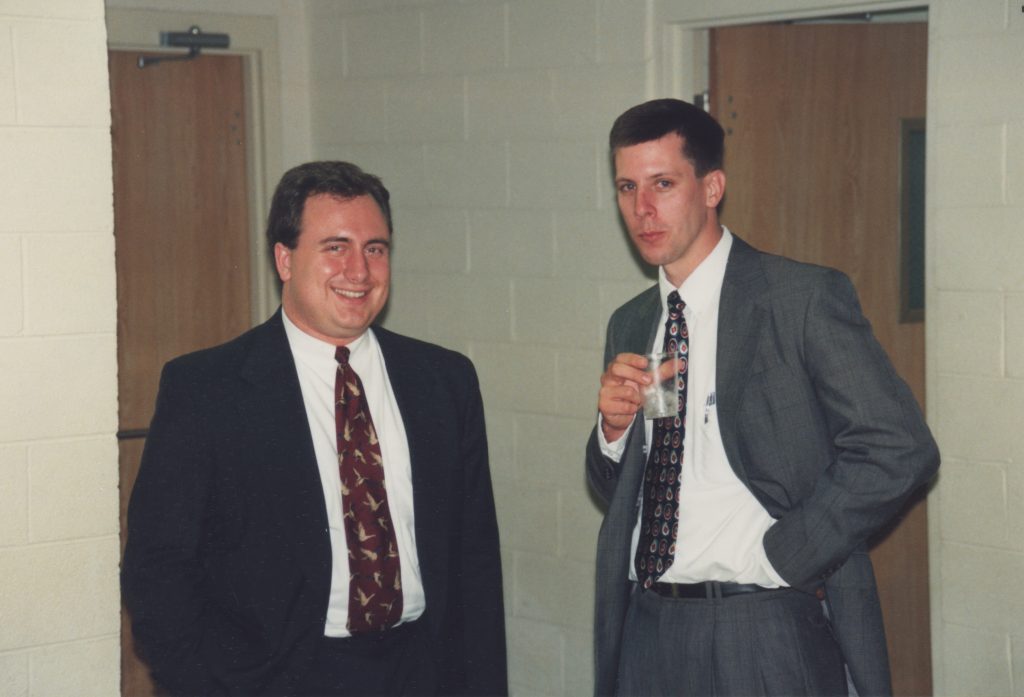
Don and his wife at the time Gaye, and Lynn and I, were the closest of friends. We shared meals and travel, and so many laughs and arguments, card games, canoe trips, and other adventures. And when they left for a new city, Don and Gaye brought us a poem. We assumed they wrote it, but it was without original signatures. So, we were never were quite certain. We kept it in a file with their names and occasionally pulled it out to read it with thanksgiving.
Don is no longer with us in the flesh on this earth. His body gave out too early and he died too young. His words and his stories and our memories of him in the poem capture some of the honesty of what it is to have genuine communion with someone, to be in community with them over time, to be beloved friends.
From Time to Time
I close with their words. Let the words from 1993 be a gift to you. I think our theologies of communion and community are always crumbling. And we are always recovering them and putting them back together. Just like the bread itself, the crumbs of life. Sometimes it’s all we get. And it’s enough. It sustains us. And sometimes we must digest it anew because it has changed yet again. And yet like Paul and Euodia and Syntyche, and Don and Gaye and Lynn, and all of you gathered on zoom and all of you gathered in this room, we are part of the mystery of the body of Christ. The love we share for one another, present in ways that go beyond time and place.
Sisters and brothers
From time to time
We gather to worship our God.
A God we know in community;
As family
Sisters and brothers
From time to time
We’ve gathered to share our tables
Revered by some to be
The most intimate of sharing among a group
Among family
Sisters and brothers
From time to time
We’ve gathered to play and be together.
Though raucous laughter and reckless abandon
Have been more common,
Even silence has given comfort in life and death;
The comfort of family.
Sisters and brothers from time to time
We will gather
To worship God
To share our tables
To play and be together,
Because we are family
God bless this communion and this community through the Spirit who calls us and holds us together.
